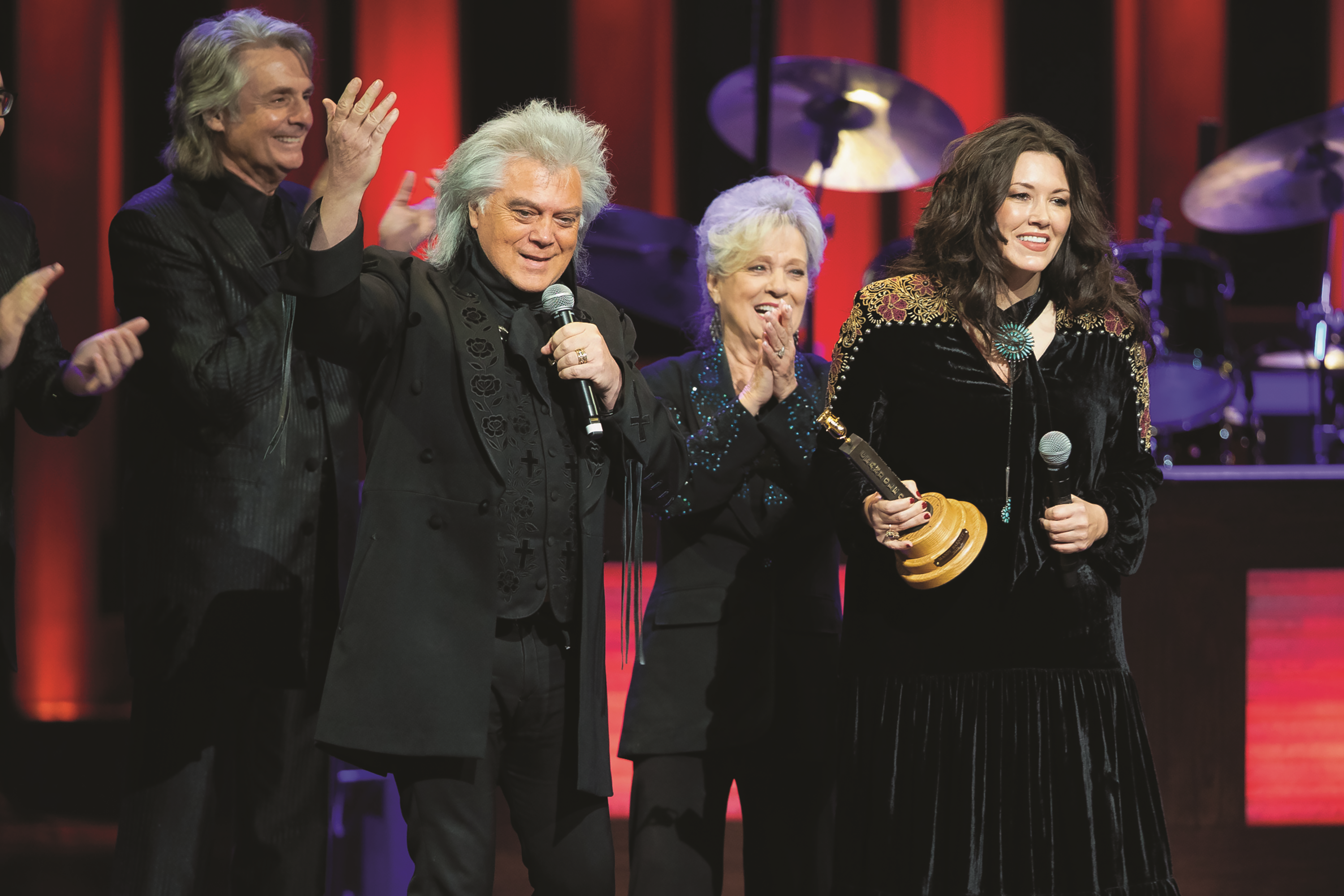Features
Blazing Her Own Trail: Mandy Barnett Becomes The Opry’s Newest Member

Chris Hollo – Marty Stuart and Connie Smith
applaud Mandy Barnett during her induction to the storied Grand Ole Opry Nov. 2.
In Nashville, where terrestrial radio is the alpha and the omega, women country artists make tough decisions when it comes to their careers. Some opt to create music that might be palatable to (often) rock program directors who’ve been moved to country – men who’d already presided over creating a one-format sausage-fest genre, knowing chances of breaking through are slim, while making music that’s truly memorable is unlikely.
Mandy Barnett, like Nov. 8 cover girl Kacey Musgraves (Pollstar subscribers can read the story now via the digital edition), opted for fierce musicality. Honoring the songs more than the game, she cut a path unlike any who’d come before.
Discovered by iconic producer Jimmy Bowen at 11, who signed Barnett to MCA; though she never released an album, the little girl from Crossville, Tenn., who sang for Roy Acuff in his dressing room at the Opry, grew up marinating in classic country.
With a plangent velvet voice, one that rises and crashes with such nuanced emotion, she was tapped to play Patsy Cline in the 1994 debut of the two-woman play “Always… Patsy Cline” at the just reopened Ryman Auditorium.
Barnett understands complicated desires, making her brand of torch country perfect for neon-lit taverns, truck drivers’ AM radios and Saturday nights that often crash into Sunday mornings.
With a self-titled 1996 debut album featuring songs by progressive traditionalists Rodney Crowell, Jim Lauderdale, Jaime O’Hara and Kostas on Nashville’s resurrected Asylum Records, the 20-year-old chanteuse never broke through.
But she earned praise from Rolling Stone, TIME and The New York Times and became a regular Opry guest.
Courted and signed by Seymour Stein to Sire, produced by Owen Bradley (known for his work with Cline and Loretta Lynn), the ebony-tressed vocalist was a secret handshake among people who knew greatness.
Having performed her Nashville Songbook repertoire at Feinstein’s in New York, she takes her post-modern traditionalism places most country vocalists never dream. But she never forsakes her roots, returning to the Opry for frequent incandescent performances.
It’s why when Country Music Hall of Famer Connie Smith emerged from the Opry’s wings and sang “Happy Birthday,” Barnett was visibly moved. But when the petite platinum blond opened a card and began reading, the words led to the ultimate birthday present: an invitation to join the Grand Ole Opry as a full member.
Tuesday night, that dream came true. The young girl, wide-eyed and brash, singing for the hardcore Acuff, had fully realized a destiny sown and grown in the real soil of country music. For her 528th performance over the last quarter century, she mined her first single (the embrace living and love “That’s Alright With Me,” a turn on “The Whispering Wind” from her Owen and Harold Bradley smolder fest I’ve Got A Right To Cry named Country Album of the Year by several publications), and a swinging “Won’t You Come Home, Bill Bailey,” her homage to Cline who delivered her own jazzy spark to the Rat Pack classic.
Julie Fudge, Cline’s daughter, brought her children to witness this woman who’s one of the few who embodies the iconic vocalist’s erotic charge. With a bouquet of long-stemmed roses, Fudge presented Barnett with a portrait her mother’d signed and a canceled check for cash for a trip to Dallas, where “Always… Patsy Cline” and the friendship that inspired it was set. WSM-AM morning man/Opry announcer Bill Cody introduced Grammy-winner Marty Stuart, who’d first played the Opry with Lester Flatt at 13. Stuart asked Barnett to step “into the Circle” – of wood taken from the Ryman and embedded in the stage – “that’s ground zero.” Inviting Smith and his band the Fabulous Superlatives to encircle her, Stuart spoke of her commitment to music, love of the history and closed with “I can’t think of anyone more born for this moment.”
Wiping back tears, she confessed, “This moment means everything to me. I’ve been pinching myself since my birthday…”
Thanking “my late friend Mr. Harold Bradley, who wanted this moment for me as much as I do,” she acknowledged many of the people who’d supported her unwavering commitment to excellence over 25 years of making records.
Cody closed the evening with “…and her first as a member of the Grand Ole Opry,” as Barnett drenched Hank Williams’ “I Can’t Help It If I’m Still In Love With You” with the sweetness of loving something you can’t have. With only Randy Hart on piano, the emotion she pulled through the stark ballad created a shimmering sense that perhaps love lost matters most of all.
